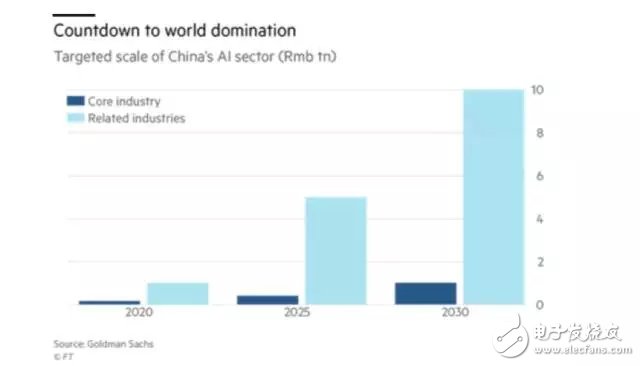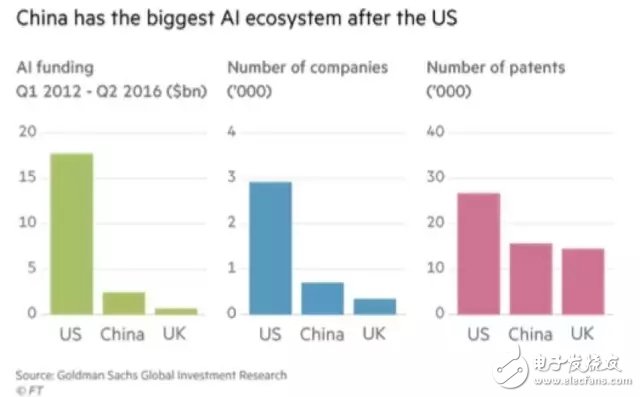In the 19th National Congress, artificial intelligence was proposed as a key issue. Combined with China's market research, it can be known that although the artificial intelligence market is hot, there are still shortcomings.
Xi Jinping mentioned many times that technology is the key to innovation. "China's economic development must break through the bottleneck and solve deep-seated contradictions and problems. The fundamental way out lies in innovation. The key is to rely on scientific and technological strength. The contribution of scientific and technological progress to China's economic development has already been Rose to 56.2%."
When he reported to the party's 19th National Congress on behalf of the 18th Central Committee yesterday, Xi Jinping mentioned: "To build a modern economic system, we must focus on the development of the economy on the real economy, and improve the quality of the supply system as the main direction. Significantly enhance China's economic quality advantages. Accelerate the construction of manufacturing power, accelerate the development of advanced manufacturing, promote the deep integration of the Internet, big data, artificial intelligence and the real economy, in the middle and high-end consumption, innovation leading, green low carbon, shared economy, modern supply chain , human capital services and other fields to cultivate new growth points, form new kinetic energy, support the optimization and upgrading of traditional industries, accelerate the development of modern service industry, aim at raising the level of international standards, promote the development of China's industry to the high-end of the global value chain, and cultivate some world-class advanced manufacturing. Industry cluster."
We believe that the deep integration of artificial intelligence and the real economy is the charge of the AI ​​industry and the vane of the upgrading of traditional industries.
As one of the most representative and breakthrough technological forces in recent times, artificial intelligence is undoubtedly an important part of China's technological development. "South China Morning Post" reported on the 16th of this month that in this era driven by cutting-edge technological innovation, the "New Generation Artificial Intelligence Development Plan" issued by the State Council in July may determine China's international status.
At the same time, the Financial Times FinancialTImes also wrote that China is seeking global AI dominance. The article lists China's several advantages and shortcomings in the development of AI, combined with the "New Generation Artificial Intelligence Development Plan" issued by the State Council (attached at the end of the article) Full-text links) and media analysis, let's take a look at the real situation of the development of artificial intelligence in China.
Unparalleled advantages: population and dataThe "New Generation Artificial Intelligence Development Plan" clearly shows the ambition of China to dominate artificial intelligence: the overall technology of artificial intelligence is synchronized with the world advanced level within three years; in 2025, the basic theory of artificial intelligence has achieved a major breakthrough, and some technologies and applications have reached the world's leading level. In 2030, AI theory, technology, and application have reached the world's leading level, becoming the world's major artificial intelligence innovation center. The artificial intelligence core industry has a scale of more than 1 trillion yuan, driving the related industries to exceed 10 trillion yuan.
China has 730 million Internet users, almost twice as many as the United States, and Chinese netizens know more about technology. A US technician said, "China's mobile applications are a few years ahead of other countries. China is like a huge lab that can try a variety of exciting artificial intelligence apps. Here we can see a variety of The United States has to lag a lot in this regard."
“(China’s AI researcher) not only in terms of the amount of data, but also in terms of data quality greatly exceeds its competitors.†Xia Zhijin, a partner of a venture capital company owned by Temasek Holdings, said that Chinese people’s dependence on smartphones The degree is high, so a lot of valuable user data is generated.
With massive data, Chinese companies have taken the lead in speech recognition, language translation, precision push advertising, and unmanned driving. Technology giants Baidu, Alibaba, and Tencent know everything about Chinese citizens, where they go, and who they are chatting with.
In addition, FT believes that China, as the world's second largest economy, is continually investing large amounts of capital and political capital into the artificial intelligence industry to ensure that companies, governments, and the military are global leaders in artificial intelligence.
In many places, hundreds of millions of dollars are being invested in artificial intelligence. In June, the Tianjin government said it plans to provide $5 billion in funding to support the artificial intelligence industry, and has also drawn more than 20 square kilometers of land to build a "smart industrial park."
At the same time, the biggest competitors are cutting back on science funding. The budget submitted by the Trump government proposes to cut back some of the resources that support AI research institutions. The National Science Foundation has not increased its fees this year.
James Lewis, a senior researcher at the Center for Strategic and International Studies in the United States, said, "The Chinese are investing billions of dollars, while the United States is only investing millions. China spends 1,000 times more than the United States, and the United States is hard to win."

Source of funding: China's artificial intelligence ecosystem is generating
Some people think that China's efficiency in the artificial intelligence industry is improving. Lei Ming, one of Baidu’s founders, said, “The government’s way of investing in money is getting smarter. The government used to fund research projects, big search engines or schools. Now it’s more inclined to support those who are more active and can really develop products and services. private company."

According to the public report released by the Tencent Institute in August, the United States is currently leading the AI ​​field, followed by China. However, China’s investment rate in this area (the proportion of enterprises that have received investment) surpassed that of the United States, and it has come to the fore.
The report also said that in 2016, the gap between China's artificial intelligence financing and the United States was shortened, but it was enlarged in 2017, and the Matthew effect appeared. However, Internet giants and active VCs (risk investments) and PE (equity investments) are overweighting the capital layout of the Chinese AI sector.
According to the private equity data of Zero2IPO Group, from 2010 to May 2017, there were 2,218 investment events in China's AI field, involving an investment amount of 66.842 billion yuan.

The four most important factors in the development of AI are talent, data, infrastructure and chips. Goldman Sachs believes that China already has three of these elements.
According to Goldman Sachs, compared with Amazon, Google, Microsoft, Apple and Facebook, Baidu offers a basic annual salary of $126,000 for Machine Learning scientists, ranking only fifth among the six companies. Facbook ranked first with an annual salary of $160,000. But if you count the annual dividends and benefits, Baidu will be third with $220,000, second only to Facebook's $273,000 and Microsoft's $244,000.
But there are also voices that China lacks talent. A recent survey on the LinkedIn website showed that only 50,000 people in China are engaged in artificial intelligence-related technical work, far behind the United States (850,000), and one-third of the number of people working in the AI ​​technology in the UK and India.
The number of papers exceeds the EU total, but the quality is still behind the United States and the European Union.According to FinancialTImes, the number of papers in the field of artificial intelligence in China last year exceeded the total of AI papers published by 28 EU countries.
According to Elsevier's SciVal and Scopus data, the number of published papers in the field of artificial intelligence in China increased by nearly 20% last year, while the number of papers published in the EU and the US decreased. In 2016, there were 4,724 artificial intelligence papers published in China, and the total number of EU countries published was 3,932.
However, the quality of basic research is still worrying. Although China wins in quantity, China still lags behind the EU in terms of the number of papers cited at top5. But it also surpassed the United States.
The only short board: chip
Earlier, Goldman Sachs published a research report on the development of China's artificial intelligence industry. The report believes that in the development of AI, China is only one link: GPU.
In recent years, GPUs responsible for image processing have become mainstream. However, the GPU industry has extremely high industry barriers and is dominated by three giants Intel, AMD and Nvidia worldwide. In 2015, the US government announced that it would ban Intel and other chip giants from selling high-end processors for research in China, which is a blow to China, which has long relied on foreign chips.
However, in the research field, China's self-developed Shenwei·Taihu Light Computer has become the world's number one supercomputer. Goldman Sachs believes that although the commercialization of Chinese supercomputers has not yet begun, China’s dependence on foreign chips will gradually decrease over time.
Shenzhen Chaoran Technology Corp. , https://www.chaoran-remote.com
